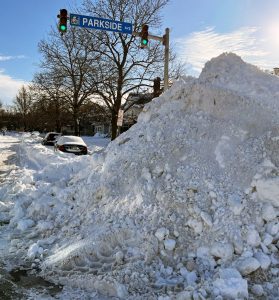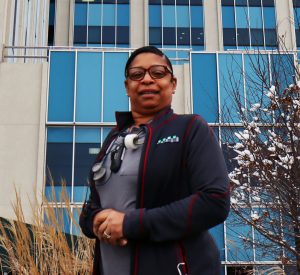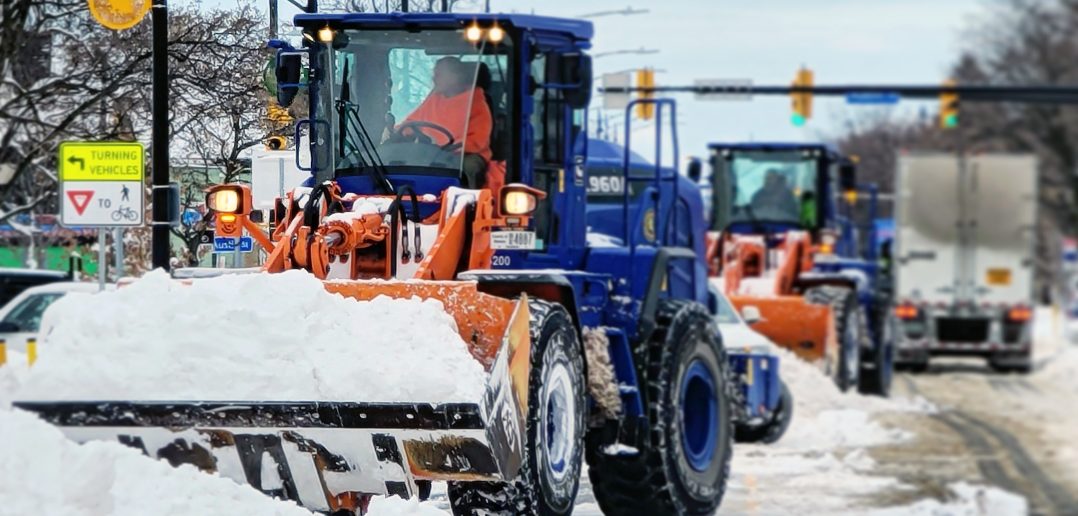
Snow piles in Buffalo were nearly as
high as traffic lights.
BUFFALO — Western New York was devastated by a crippling blizzard in late December, paralyzing the community and taking the lives of 42 residents.
The blizzard, deemed by state and local officials as a once-in-a-lifetime storm, included days of heavy snow, hurricane-force winds and freezing temperatures that led to power outages, people trapped in their vehicles for days due to impassable streets and even a forced halt of emergency services because first responders themselves couldn’t get through the snow.
Throughout the extraordinarily damaging weather, CSEA members continued to provide vital services to the community.
From 911 dispatchers and emergency room technicians, to state and local government highway workers, direct care workers and more, CSEA members both in the Western Region and other areas in the state helped community members literally survive the historic storm.
“I want to thank all of our union members in the Buffalo and Erie County region who worked tirelessly for hours and days on end – sometimes without breaks or food – and stayed committed to providing crucial services to their community during frigid temperatures, high winds and record-breaking snowfall,” said CSEA President Mary E. Sullivan. “I also want to highlight and thank members from various state agencies, including the state Department of Transportation, and locals across New York state who dispatched and deployed themselves and their equipment to Buffalo to help with lifesaving, safety and snow removal efforts.”
Caring for patients like family

Nichelle Moore, an emergency room
technician at Erie County Medical Center,
was among the hospital workers who
helped care for patients during the blizzard.
CSEA member Nichelle Moore, an emergency room technician at Erie County Medical Center (ECMC), spent nearly three days working while her fiancé and daughter were at home with no power and heat. Moore said dozens of people sought shelter, food, electricity and heat at the emergency room, and staff at the safety-net hospital provided as much support as they could to anyone who made their way there.
“As I prayed for my family’s safety, it made me want to treat the people who came in as my family as well,” said Moore. “I did everything in my power to make people feel warm and comfortable. As hard as it was to know that my family was home with no power or heat as I was at work, I knew I had to treat everyone who came through those doors like family as well.”
Moore compared the unity of hospital workers to a quote from the 1997 film “Soul Food,” which notes, “One finger won’t make an impact, but you ball all those fingers into a fist, and you can strike a mighty blow. Now, this family has got to be that fist.”
“A family in the fist at ECMC and we struck a mighty blow by taking care of the people who came in,” said Moore.
Heartbreaking circumstances
In the nearby Buffalo suburb of Lancaster, two Erie County 911 dispatchers were picked up by an emergency vehicle for their scheduled shifts on Christmas Eve, the height of the storm.
The dispatchers, Julie Astyk and Michelle Hack, couldn’t make it to their normal downtown Buffalo location for their shifts because the streets were impassable even for responders, so they went to the agency’s satellite location in nearby Cheektowaga.
Over the next three days, they took more than 30,000 calls.
Hack noted that the Erie County 911 Dispatch typically takes anywhere from 1,600 to 2,000 calls per day. To help handle the increased number of calls, dispatchers from other parts of the state pitched in (see article on this page).
While the dispatchers tried as hard as they could to help the thousands of residents who were stranded, had medical emergencies or were otherwise in need, their hands were tied once emergency services were suspended for nearly 48 hours during the worst of the storm.
“Our job is to help people, but how do you tell people that help’s not coming?” said Hack.
Astyk recalled having to tell those stranded and freezing in their cards during sub-zero degree temperatures that no one was coming for them and their only chance at staying alive was knocking on the closest house’s door and hoping people could take them in.
As Astyk, Hack and their colleagues took these heart-wrenching calls, they both felt a sense of unity amongst the 911 dispatchers.
“We all developed these bonds with each other over this situation,” said Hack.
However, that doesn’t mean they weren’t traumatized by the calls each of them took, which included having to hear those on the brink of death plead for help.
“I’m still replaying everything in my head,” said Astyk.
Despite the harrowing situation, both members and their colleagues said all they could do is continue to do their jobs as best they could.
“It was almost like we were all just on auto pilot,” said Astyk.
Hack and Astyk noted that while they both feel that 911 dispatch is often a thankless job, they felt recognized for their work during such a crucial and delicate situation.
“There wasn’t much time for our brains to think about what was going on,” said Hack. “We had a job to do.”
— Madison Ruffo




